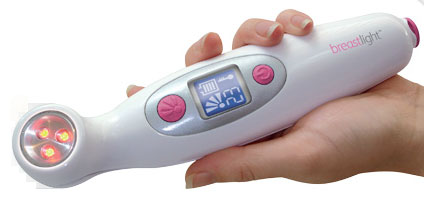
This October and all year long, honouring National Breast Cancer Awareness Month and the importance of breast health, The Local Choice Pharmacy at Springfield Retail Centre is encouraging all ladies to book a “Breastlight” self-breast examination and during this month it will be discounted by R100.
Using harmless and yet extremely powerful LED lights to penetrate through the breast tissue delivering a translucent effect, this device allows a clear view of the internal functions of your breasts.
The Breastlight device will give you a clearer idea if there are any abnormalities by showing them as a dark cluster.
As stated on the internet, this device is not a replacement for a standard check using your hands or as an alternative to a mammogram, but can offer you instant access and immediate reassurance to assist in the early detection of any breast abnormalities, that may or may not be cancerous, during the period from one mammogram to the next”.
It is encouraged that all women to have annual pap smears as well as to do breast self-examinations as well as if they have access to the breast light device in order to be aware of any abnormalities. Most women need to be aware and informed, and this additional measure can make a big difference in their lives!
SOME TIPS
At what age should I start getting mammograms?
Because young women typically have dense breast tissue, a mammogram is not always the best diagnostic tool for them. For this reason, and because dense breasts also make it more difficult to feel a lump, it is crucial that women aged 20 and older become familiar with their breasts and learn how to spot any unusual changes. Current guidelines call for annual screening mammograms to begin at age 45 or 50. If you have a family history of the disease, consult your doctor about when you should start having mammograms (or other forms of breast cancer screenings) and how frequently you should have them. (https://www.youngsurvival.org)
How can I detect my breast cancer early?
The best way for young women to find breast cancer early is to be breast self-aware. Become familiar with your breasts: their shape, size and what they feel like. Learn what is normal for you. Sometimes your breasts may change throughout your monthly cycle. If you are pregnant or nursing, your breasts will change even more dramatically. If you find anything unusual, see your doctor immediately and insist on a diagnosis. In general, women should have a yearly clinical breast examination by a doctor beginning at age 20 and start having annual mammograms beginning at age 45. (https://www.youngsurvival.org)
What is the incidence of breast cancer in young women?
Despite the prevailing opinion that young women don’t get breast cancer, the reality is that they can and do. In fact, one in every 229 women between the ages of 30 and 40 will be diagnosed with breast cancer in the next 10 years. (https://www.youngsurvival.org)
What are some of the symptoms of breast cancer?
- A lump or abnormality in the shape or feel of the breast
- A lump in the underarm area
- A generalized swelling of all or a part of the breast
- An irritation or dimpling of the skin on the breast
- Nipple retraction (nipple turning inward)
- Rash, redness or scaliness on the nipple or breast skin
- Spontaneous discharge from the nipple
These exams are for women at average risk of cancer. If you believe you may be more likely to develop cancer because of your personal or family medical history, use guidelines below.
- Ages 20 – 29
- Clinical breast exam every one to three years to check for breast cancer
- Liquid-based Pap test every three years to check for cervical cancer, starting at age 21.
- Ages 30 – 39
- Clinical breast exam every one to three years to check for breast cancer
- Liquid-based Pap test and HPV test every five years to check for cervical cancer
- All Ages
- Speak with your doctor about cancer screening exams for ovarian, endometrial, lung and skin cancers. Exams are available for those at increased risk.
- Regardless of your age, practice breast awareness. This means you should be familiar with your breasts so that you’ll notice any changes and report them to your doctor without delay. (https://www.mdanderson.org)
- Last but not least, even though males do not develop milk-producing breasts, a man’s breast cells and tissue can still develop cancer. Even so, male breast cancer is very rare. Less than one percent of all breast cancer cases develop in men, and only one in a thousand men will ever be diagnosed with breast cancer. So, it is important for men to monitor any abnormalities and go for a check up if discovered.
So, if you are within the local area of Springfield Retail Centre, make an appointment with The Local Choice Pharmacy and visit their onsite clinic to make this important appointment that will bring some light on your breast health.
Call them now on 0312630040




























